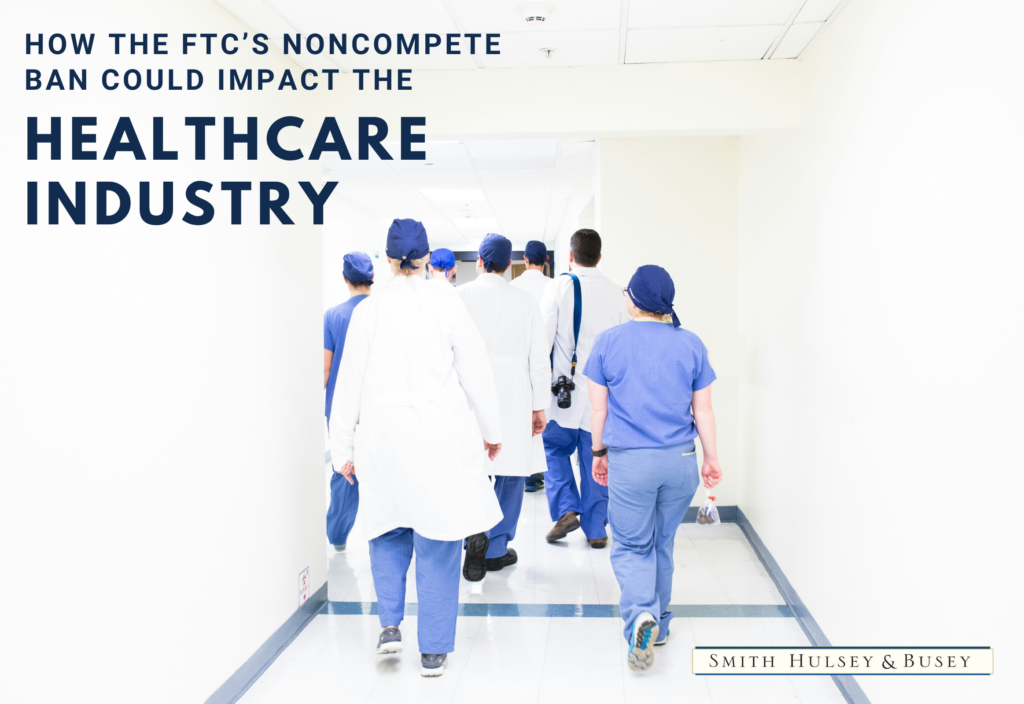
An unprecedented change in U.S. employment law is poised to reshape the healthcare industry by redistributing the balance of power between employers and employees — and it’s already triggered a wave of lawsuits.
The Federal Trade Commission’s (FTC) long-anticipated rule bans noncompete clauses in all sectors of the U.S. economy and also applies to existing agreements (with a few exceptions). The FTC initially proposed the noncompete ban in January 2023 and approved the rule, with a few changes, on April 23, 2024.
The FTC rule describes noncompete agreements as an unfair method of competition. The federal agency reasons that noncompete agreements limit competition because they prevent employees from leaving their jobs and make it harder for employees to find new roles after their employment ends. Critics argue that the rule could hamper employee retention, undermine competitive advantages, devalue businesses, put intellectual property at risk, and will spark a flurry of lawsuits.
This development has significant implications for the healthcare industry, in which employees at all levels are frequently asked to sign noncompete agreements. I addressed this in a panel hosted by Cobbe Consulting & Management , which serves physician and medical specialty societies and medical practice management organizations.
Here’s a breakdown of the key implications of the rule and the burning questions yet to be answered.
Physicians are not treated differently under the rule
The rule broadly states that no business entity under the FTC’s jurisdiction can limit its employees’ work or business ownership after their employment ends, nor can it penalize former employees for working or owning a business. The FTC’s ban includes other types of agreements, like nonsolicitation agreements and tuition repayment agreements, if their terms are so broad that they limit workers’ ability to leave their jobs, get new jobs, or own businesses.
The ban covers all workers, including employees, independent contractors, unpaid volunteers, and interns. The rule requires employers to give all current and former employees written notice that their noncompete clauses won’t, and can’t, be legally enforced.
There are limited exceptions
The rule has a limited exception for senior executives, which means some physicians whose roles involve strategic decision-making and overseeing staff could still be subject to existing noncompete clauses. Even senior executives, however, cannot be asked to sign new noncompete agreements after the rule takes effect.
Other exceptions include:
- Noncompete clauses relating to the bona fide sale of a business;
- Existing causes of action, meaning employers may still enforce noncompete claims if employees violate existing noncompetes before the rule takes effect; and
- Circumstances where there is a good-faith basis to believe the rule doesn’t apply.
Questionable application to nonprofits
The FTC has traditionally recognized that it lacks the authority to regulate the activities of nonprofit entities. In the comments accompanying the new rule, the FTC noted that not all organizations designated as nonprofits by the IRS will qualify as nonprofits under the FTC’s analysis. The FTC will apply a two-part test to determine whether an employer is a nonprofit that falls outside the FTC’s authority.
The rule overrides state law
As the FTC is a federal agency, this rule trumps state laws allowing noncompetes (for example, the Florida law that requires courts to enforce noncompetes that meet certain criteria). On the other hand, state laws that restrict noncompete agreements even further than the FTC’s rule (for example, California’s total ban) will remain applicable.
Major ramifications for the healthcare industry
As the rule is so broad, many employment law attorneys and scholars feel it raises more questions than answers.
One concern is that the ban could reduce investment in healthcare industries. For instance, it’s difficult for a group to gauge the value of a practice before an acquisition if it can’t be sure that its physicians will remain employed instead of starting a competing practice nearby. Such a significant shift in healthcare industry operations could lead business leaders to be more creative about compensating senior executives and structuring transactions to keep key personnel in place.
The ban will face multiple legal challenges
With lawsuits already pending — including one from the U.S. Chamber of Commerce — and more litigation expected, it remains to be seen whether the ban will survive and, if it does, what final form it could take. Even the FTC’s right to regulate noncompetes as a method of unfair competition is up for debate.
Although federal law generally trumps state law, it’s likely that many states will challenge the rule because of its broad application and disruptive effect on multiple industries.
When will the ban go into effect?
The rule will become law 120 days after it’s published in the Federal Register (currently scheduled for May 7, 2024). The ban is expected to go into effect in early September, but it could be delayed if the courts agree to stop it from being enforced until litigation is resolved.
Follow us on
 for more content updates
for more content updates
